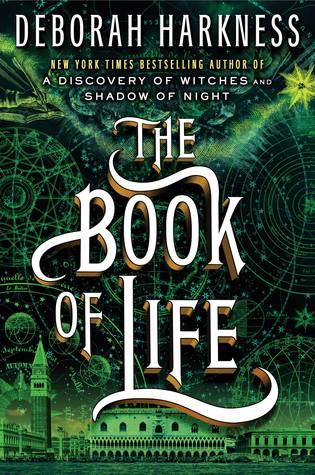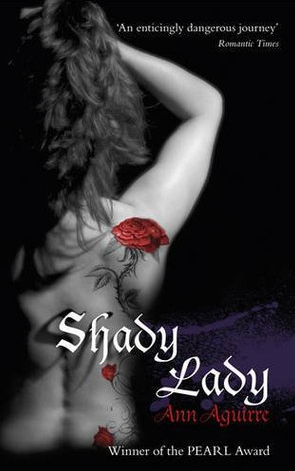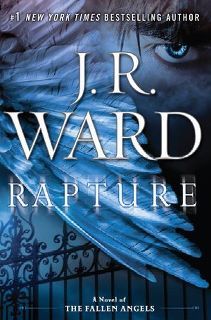I received this book for free from the library in exchange for an honest review. This does not affect my opinion of the book or the content of my review.
Source: the library
Shadow of Night
by
Deborah Harkness
historical fiction, urban fantasy in Hardcover edition that was published by Viking Adult on July 10, 2012 and has 584 pages.
Explore it on Goodreads or Amazon
Other books by this author which I have reviewed include A Discovery of Witches, The Book of Life, Time's Convert, The Black Bird Oracle
Second in the All Souls historical suspense? urban fantasy?? series revolving around Diana Bishop de Clermont and Matthew de Clermont.
In 2012, Shadow of Night won Goodreads Choice for Best Paranormal Fantasy.
My Take
I can totally sympathize with Diana’s excitement at being in 1590 Elizabethan England. And I think Harkness was brilliant in her portrayal of the time as well as the thought she put into what Diana’s problems would be in the period. The details she provides from the house in Woodstock, the journey to Sept-Tours, and the wealth of atmosphere she provides in London on its streets and in its shops.
I certainly didn’t expect Kit Marlowe’s issues in this! Nor do I understand why Matthew tolerated his betrayals.
Harkness swept us back and forth between the sixteenth century detailed hunt for Ashmole 782 and the future which touched on events and how the past ties into what is happening in their future. The contemporary de Clermonts are hunting down anything left behind by Matthew or Diana that might tip off the enemy. Even as Peter Knox comes across some of those items and Diana worries about how to keep those items safe or into the hands of those who will ensure their delivery over four hundred years later so she and Matthew can slip through time.
I was rather surprised that the “dread” event Harkness set us up for in book 3 hasn’t left me on tenterhooks, however.
The bits from Shakespeare that Harkness inserts are very well done. Even better as she ensures we know that Shakespeare is just starting at this time with most of his work still to come.
It’s too bad that Matthew didn’t pay more attention to Diana’s concerns. She made an excellent point about someone from further away (time-wise!) having better perspective than someone right in the middle. It’s interesting to see how Matthew falls into the habits of the time in how he treats Diana. Admittedly, Diana is acting more like a tourist than an historian who should know better. Certainly anyone who has read some history knows that childbearing and childbirth were pretty iffy.
It’s tense as Harkness takes us further into the story with all these problems cropping up around the turn Diana’s magic has taken. It isn’t until almost four-fifths through that we finally learn what the problem is. Nor is this the only tidbit with which Harkness teases. There’s the whole mating thing in which Philippe is furious with Matthew’s choice of wife and he insists that the two go their separate ways.
Too typical of ignorant people, thinking Euclid’s Elements is evidence of black magic. The ignorance and twisting of words used is so like that in Robert McCammon’s Speaks the Nightbird, it just made me furious.
Oh, gimme a break, Diana agreed to secrets and not lies. So how can she jump all over Matthew when she finds out he’s a spy. It’s not like he lied about it. It was simply a secret.
Diana thinks Matthew is reverting to a mindset of “he is the man and she is merely a woman”, but that’s before their journey to Sept-Tours and she watches him become more prince-like in his bearing and demands.
It’s so awful meeting this Philippe in the past and knowing what happens to him in the future. What a waste! Of course, he is a very ruthless man until he is assured of your loyalty. Then I cried when Matthew and Diana left Sept-Tours and “Philippe was riding along a neighboring ridge, determined not to let go of his son until it was necessary”. Oh, and then Ysabeau finds that note he wrote for her…
It’s so sad to hear what Matthew really thinks of himself, all due to harsh words said to him over 1,500 years ago. It should make parents consider the words they use with their children, how they could affect their lives.
I don’t know why Diana is complaining about Matthew behaving like an idiot. He’s certainly not alone in his stupid behavior. Then Mary Sidney makes an interesting comment about women in their time. And how very lucky she and Diana are to not have to work to survive. That they have the books and the time to indulge their passions.
Which part of Diana was spellbound and her parents died when she was young is Mistress Norman not grasping??
Oh, brother. I was so not expecting Harkness to fall into this trap. Especially with someone as intelligent as Diana. Why do so many authors take this easy way out to create drama? Sure, it makes sense to wonder if Diana could really be a weaver, but only briefly. It’s obvious enough that her power is odd and the explanation of weaving only makes sense of it. Why couldn’t Harkness simply have her marvel at it instead of deny it! Have her ask questions rather than insist that it can’t be her! This is so unlike Diana’s character that it makes me nauseous!
No, no, no. Harkness is taking a stupid and lazy way out again. There are all sorts of other possibilities for Jack than Hubbard. Gimme a break.
It seems that adding Diana and then Matthew’s blood to the countess’ arbor Diane may reveal some useful secrets.
Matthew’s attitude toward the queen in private reminds me of Dennoriel in Mercedes Lackey’s Doubled Edge series.
Oh, I love reading about Gallowglass’ feelings in 2010 as the clues about Matthew and Diana surface! We also discover a lot about Matthew’s talents from his poetry to his architectural prowess. Diana also has an encounter with her ancestors Rebecca and Bridget White.
In spite of a number of small holes and uncharacteristic quirks, this was an excellent read. Although, learning the truth about Ashmole 782 is totally disgusting as well as intriguing. Luckily, the first three missing pages are still there and Diana recalls them perfectly.
The Story
It’s a flight to safety…they hope. Away from the Congregation to find a witch to teach Diana what she needs to know and the opportunity to look for Ashmole 782.
They land at the Old Lodge in Woodstock in Oxfordshire where Matthew is known and has a home base where she is received well for the most part. Kit has his particular jealousy issues. And, magic-wise, something has happened to Diana’s magic. It doesn’t work as it had and new possibilities are appearing.
Witches are being imprisoned, tortured, and burned in Berwick, Scotland.
Then Philippe, Matthew’s father, demands Matthew’s presence in Sept-Tours. It’s a time of discovery and understanding before the two are forced back to London. A London where Matthew keeps rooms at the Hart and Crown in Blackfriars where Diana discovers “one of the world’s first file cabinets”.
London is a dangerous place for Diana and Austria with Rudolf’s desire for Diana is even worse. Too many factions are interested in her existence or lack thereof. And any one of them could set the Congregation on her. Their law demands that a witch and a vampire do not couple or exchange blood. God knows what they’d say if they knew about the baby.
There is no safety in time for Diana.
The Characters
Diana Bishop is a witch who has only recently learned of her lineage. She and Matthew have married but not yet consummated their marriage. She encounters Steven Bishop, her father, on a London Elizabethan street. He certainly has a lot of home truths and demands for Diana!
Matthew de Clermont is known as Roydon in England. He’s the queen’s spy, holds the family’s seat on the Congregation, is a Knight of Lazarus, and a Catholic in a Protestant country. Seems he’s also a gifted poet and architect.
Pierre Cornu, Françoise, and Charles are Matthew’s servants in this time. Gallowglass is Matthew’s “nephew”, Hugh de Clermont’s “son”, and he has his reasons for avoiding France. Davy Gam, a.k.a., Hancock, is another vampire.
Philippe de Clermont is the father Diana meets in this time period; he heads up the Knights of Lazarus and he demands obedience from everyone. Alain is the vampire servant Diana meets now who took such care of her in the future. Chef is the cook; Catrine functions as Diana’s maid; Jehanne, Thomas, and Étienne are additional servants at Sept-Tours.
Matthew’s friends in Elizabethan England are the group Shakespeare referred to as the School of Night
Kit Marlowe is a spy, a writer, a daemon, and a man serving way too many masters in his attempt to serve himself. Sir Walter Raleigh is a favorite with the queen and Matthew’s equal in intelligence, power, and ruthlessness; he’s also the head of the Knights in England. Henry Percy is the “Wizard Earl” of Northumberland. A gentle giant and the ninth Knight. Tom Harriot is an astronomer whom Diana helps with a telescope. George Chapman is a writer.
Widow Beaton is the first witch Matthew approaches against Diana’s wish; she, Iffley, Bidwell, and the Reverend Danforth cause all sorts of problems for Diana.
In London…
Elizabeth I is Queen of England and Matthew is one of her favorites. William Cecil, Lord Burghley, is the Queen’s spymaster and the lord high treasurer to whom Matthew reports. Mary Sidney is the Countess of Pembroke and a serious student of alchemy. Nicholas Hilliard is a limner. Master Nicholas Vallin creates some interesting items for Diana. Jack Blackfriars is a street rat they take in. Father Andrew Hubbard considers himself the head vampire in the City of London and requires all to become a part of his family. He’s a threat, but also a resource.
Annie Undercroft is a young witch and Hubbard’s spy. Susannah Norman is the spitting image of Sophie Norman, the daemon from Diana’s time. (Margaret is Sophie’s baby whom Emily saved.) Goody Alsop is a weaver, a maker of spells. Weavers are rare witches and most try to kill them. Marjorie Cooper (and Norman) are earthwitches, Elizabeth Jackson is a waterwitch and a gifted seer, Catherine Streeter is a double firewitch and they join with Mistress Norman and Goody Alsop to teach Diana.
The Austrian Adventures
Dr. John Dee, the holder of Ashmole 782, sends Matthew and Diana off to Emperor Rudolf II. It seems that Edward Kelley, his daemonic helper, stole it and gave it to Rudolf. Dr. Tadeáš Hájek is the emperor’s physician. Master Ottavio Strada, an historian and the Imperial librarian, is not inclined toward Matthew. As proof of Rudolf’s interest, everyone at court is interested in her including Joris Hoefnagel, an artist and calligrapher, and Master Spanger is another painter and Diana is beset with appointments to have her horoscope with Erasmus Habermel; she must sit for her portrait with Signor Miseroni; and, Alfonso Pasetti will help her practice her dance for the next week’s entertainment. Rabbi Judah Loew, a.k.a., Maharal, agrees to see Diana and introduces her to Abraham ben Elijah, a witch who made the golem. Benjamin Fuchs interrupts Diana’s meeting with Abraham. He is also Matthew’s “son” and he disowned the de Clermont family.
The Future Characters
Aunt Sarah is a witch who has taken refuge at Sept-Tours. Ysabeau is Matthew’s “mother”; her blood carries the blood-rage that was passed on to Matthew, Benjamin, and Louisa. Phoebe Taylor is the junior clerk at Sotheby’s who is forced to wait for Dr. Marcus Whitmore, another of Matthew’s “sons”, to arrive to view two Hilliard miniatures. He finds Phoebe well worth the trip and Phoebe wonders if he isn’t a Regency rake. Verin de Clermont is married to her human, Ernst Neumann, and she has just learned [in 2010] of a manuscript belonging to Mary Sidney.
Gerbert of Aurillac is a bad vampire and he’s conspiring with Peter Knox, a witch with the Congregation, against the de Clermont family.
The Congregation is made up of Supernaturals. They work together to ensure that man never learns of their existence. Well, ideally they’d work together if they could get past their own hang-ups.
The Cover and Title
The cover is very Renaissance-like with its crowded tiny city of buildings at the base, connected via purple nets to a horoscope-like royal blue medallion that incorporates da Vinci’s Vitruvian Man.
The title refers to Matthew, the Shadow of Night is reference to his nature.













